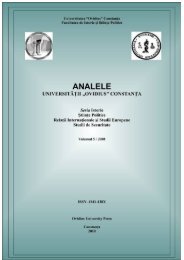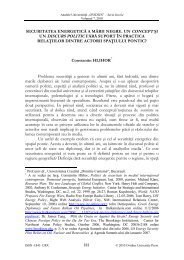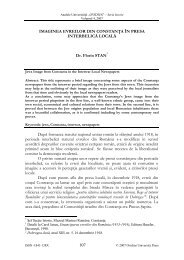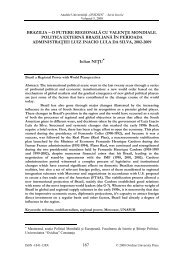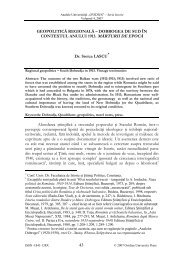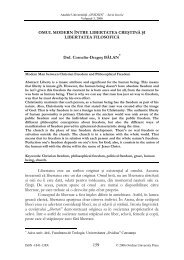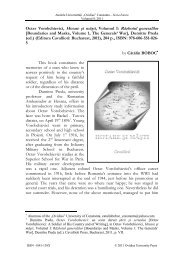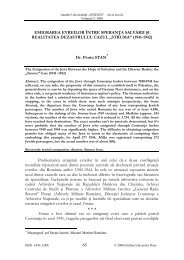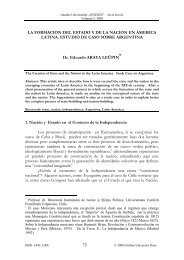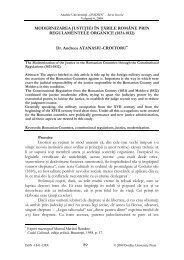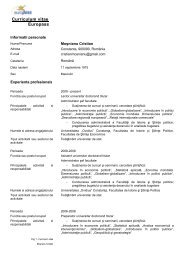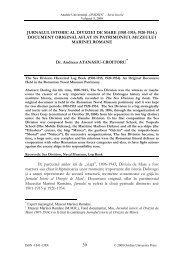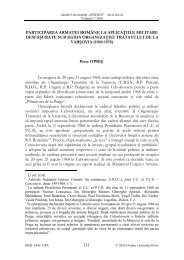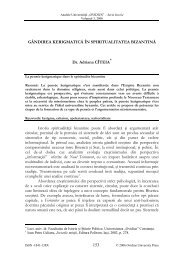analele universitÄÅ£ii âovidiusâ constanÅ£a - AUOCSI
analele universitÄÅ£ii âovidiusâ constanÅ£a - AUOCSI
analele universitÄÅ£ii âovidiusâ constanÅ£a - AUOCSI
You also want an ePaper? Increase the reach of your titles
YUMPU automatically turns print PDFs into web optimized ePapers that Google loves.
Luiza Filimon / Analele Universităţii „OVIDIUS” / Vol. 6/ 2009<br />
When Dr. Wendy Bracewell, Director of the Centre for South-East<br />
European Studies, delivered the final note of the conference on "Balkan<br />
Security: Visions of the Future" which took place at the School of Slavonic and<br />
East European Studies in 2000, she said "the main aim of that conference was<br />
communication" and an audience tired but also stimulated by so much talking<br />
readily nodded in agreement 1 .<br />
For any project that might stand a chance of being feasible and that<br />
might produce the expected results, it is of the most critical importance for the<br />
parts to come to a consensus. It has been agreed upon, that matters related to<br />
historical correctness have been a can of worms and that, in the 21 st century,<br />
they represent somewhat an anachronistic concept. This is though, a standard<br />
point of view. It is logical, solely based on the damage control dogma and the<br />
fault it bears is that one way or another, it ignores the subjects and simplifies the<br />
issue. It is time, we put the past away, it is time we learned from the scars and<br />
bullet holes, it is time for rest. The only aspect we have to bear in mind is that<br />
we must be certain of the newly restored peace foundations. Kosovo has proven<br />
to be a considerably complex case-study of conflict resolution that appears to<br />
confirm the view that nowadays winning the peace is a much more demanding<br />
and multidimensional task than winning the war 2 .<br />
Security is an ambiguous and ambivalent term. It is a common practice<br />
to analyze it from political, economical, social and environmental point of views<br />
alongside the usual military concerns. Director of the Centre for South-East<br />
European Studies, Dr Peter Siani-Davies, at the “Balkan Security: Visions of the<br />
Future” Conference, pointed out that thinking of security in such terms does<br />
raise particular problems, continuing not only has the link between the new theoretical<br />
modeling and actual security needs on the ground in a specific region, seldom been fully explored<br />
but in the process the boundaries of what constitutes a security issue have become blurred, with<br />
concepts such as societal and economic security proving elusive to grasp. And if we cannot<br />
understand what security is, then, how can we know what measures we need to take to ensure<br />
that it is fostered 3 .<br />
Security has been interpreted narrowly for far too long: either as security<br />
of territory... or as safeguarding national interests... or as global security from the<br />
looming scare of atomic holocaust. Ten years ago to this date, the Global<br />
1 Conference Balkan Security: Visions of the Future summary, Dr. Wendy Bracewell<br />
commentary, at CSEES, UCL, 16 and 17 June 2000, held at the School of Slavonic and East<br />
European Studies, University College London, accessed: November, 23, 2009, at:<br />
http://194.66.92.239/balksec.htm.<br />
2 Ioannis Natsis (2006), U.N. in Kosovo: 1999-2005 An assessment of international<br />
administration” - Postgraduate Notes, Hellenic Foundation for European and Foreign Policy<br />
(ELIAMEP), accessed: November, 18, 2009, p. 45, at: http://www.eliamep.gr/oldsite/eliame-old/eliamep/www.eliamep.gr/eliamep/files/PNO6.02.pdf.<br />
3 Conference Balkan Security: Visions of the Future Summary, Dr Peter Siani-Davies<br />
address, ibidem.<br />
ISSN -1841-138X 78 © 2009 Ovidius University Press



